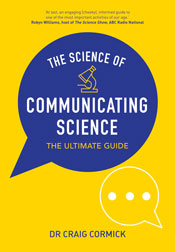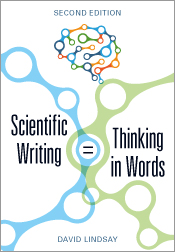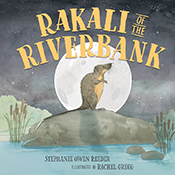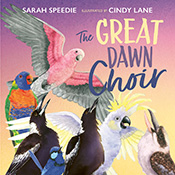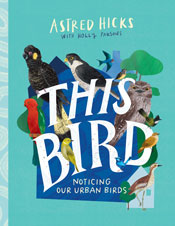The Science of Communicating Science
The Ultimate Guide
By: Craig CormickA practical guide to communicating science to influence beliefs, behaviours and policies.
Are you wishing you knew how to better communicate science, without having to read several hundred academic papers and books on the topic? Luckily Dr Craig Cormick has done this for you! + Full description
This highly readable and entertaining book distils best practice research on science communication into accessible chapters, supported by case studies and examples. With practical advice on everything from messages and metaphors to metrics and ethics, you will learn what the public think about science and why, and how to shape scientific research into a story that will influence beliefs, behaviours and policies.
- Short descriptionNews
Customers in Europe, the Middle East, Africa and Asia should order through our co-publishing partner, CABI (external link).
Read more on our blog:
Author Craig Cormick reveals his three top tips for communicating science to influence beliefs, behaviours and policies: The Secrets of Good Science Communication: telling stories that matter with Craig Cormick
Reviews
"In his guide to communicating science, Craig Cormick practices what he preaches: data instead of intuition, humour as a tool, stories as the medium. He illustrates how to communicate science in a way that generates lasting interest, rather than hype that inevitably disappoints or pomposity that keeps curiosity at bay."
Dr Alan Finkel, Chief Scientist of Australia
"When science becomes contentious and the polarised debate slows down scientific progress, there is only one way to make science infectious to all stakeholders – by communicating it. Albert Einstein, Stephen Hawking and Carl Sagan did exactly that and did it exceptionally well. Craig Cormick joins this league with his own style, infusing humour and in a storytelling mode. It is not easy to decipher the complexity of science communication. Craig did it so well, covering all aspects, making this book a great reference for everyone in the STEM fields."
Dr Mahaletchumy Arujanan, Global Coordinator, ISAAA and Executive Director, Malaysian Biotechnology Information Centre
"At last, a spirited, engaging, (cheeky), informed guide to one of the most important activities of our age. Get science communication right and you can make us a better world - and we certainly need one. This book is perfect for all: hopeful professionals, interested bystanders and those who just want to have fun. I read it TWICE."
Robyn Williams, ABC's The Science Show
"Craig Cormick’s book, The Science of Communicating Science, is a wonderfully written and practical guide to the art of science communication. Cormick brings to the topic his many years of experience working in the communication of contentious areas of science and every chapter is underpinned by his understanding that science communication is a lot more than ‘exciting the masses with research’. The receiver is just as important as the purveyor of knowledge and Cormick shows a genuine interest in and respect for the enormously varied needs and beliefs of ‘the audience’. The idea that all we need to do is tell ‘the public’ about science and they’ll all be fans is well and truly put to bed. The book does an excellent job of taking us outside the science communication silo, forcing us to ask why are we communicating and what’s in it for our audience? I highly recommend this book for anyone who wants to be an effective science communicator."
Dr Susannah Eliott, Chief Executive Officer, Australian Science Media Centre
"There is always a risk in writing a book about science communication. It needs to be accurate, comprehensive and easy to read. Craig Cormick does not miss. This is the ultimate guide for all science communicators whether they be students, at the beginning of their career or seasoned practitioners. Craig Cormick brings together his deep experience and insights in science communication research and practice in this must read book. You’ll go back for more."
Anna-Maria Arabia, Chief Executive, Australian Academy of Science
"Craig Cormick has packed a career’s worth of observations, know-how, and plain good sense into this book that gives an introductory survey on how to communicate well about complex matters. The highlights for me were his reflections on how to get to know audiences — and his cartoons which show how to segment those audiences by what they want to know. This is useful material for reflective scientists and communicators."
Professor Joan Leach, Australian National Centre for the Public Awareness of Science, Australian National University
"This could be the go-to science communication how-to book."
Katherine Prater, RELATE
"First impression. ‘Oh no, not another book on science communication’. Second impression on reading the book. ‘This is really good and useful. I like the style’. Third thought. ‘Perhaps there is room for just one more book. Every student of science and science communication should read this one.’"
Professor Graham Durant, Director of Questacon
"The Science of Communicating Science is a rare book that combines academic rigor with the ease of reading a blog. It's a solid one-stop
shop where scientists can learn about the main aspects of science communication without – as the blurb says – “having to read several hundred academic papers and blogs and books.”
ISAAA.org Blog, 6 November 2019
"‘The Science of Communicating Science’ has re-ignited the fire in my belly to start communicating my science even more effectively, and I thoroughly recommend it to scientists at any stage of their career or research field."
Australian Marine Science Association Bulletin, 2020
"Recommended reading for anyone interested in the communication of science, and especially for those who don’t understand why it sometimes doesn’t work."
Phillip Berrie, Teaching Science 66(1), March 2020
Details
Paperback | November 2019 | $ 49.99ISBN: 9781486309818 | 256 pages | 245 x 170 mm
Publisher: CSIRO Publishing
Illustrations
ePDF | November 2019
ISBN: 9781486309825
Publisher: CSIRO Publishing
Available from eRetailers
ePUB | November 2019
ISBN: 9781486309832
Publisher: CSIRO Publishing
Available from eRetailers
Features
- Captures the breadth of contemporary research on how to communicate science in plain English
- Supported by examples and case studies throughout
- Highly entertaining and informative
Contents
AcknowledgementsIntroduction
THE GROUND RULES
1 – What makes good science communication? (in fewer than 280 characters)
2 – Why we need to communicate science better
3 – Burying the deficit model
4 – Objective! Your honour!
5 – What do the public really think about science?
6 – There is no one public: Making sense of segmentation
COMMUNICATION TOOLS
7 – Messages and metaphors
8 – Once upon a time: Storytelling
9 – Trust me, I’m a scientist
10 – Media matters
11 – Being a social media superstar
12 – I’ve been framed! The art of framing
13 – Who’s afraid of public speaking?
14 – Getting engaged
15 – P-values: Policy and politics
16 – Evaluation: Metrics, damn metrics and statistics
WHEN THINGS GET HARD
17 – I’m a believer! Understanding different beliefs
18 – The risky business of communicating risk
19 – Valuing values
20 – Can you really change behaviours?
21 – Communicating controversies: The good, the bad and the ugly
22 – Debunking bunkum
SCIENCE COMMUNICATION ISSUES
23 – Fantastic ethics and where to find them
24 – Why we don’t actually know what we think we know
25 – Last words: Sermon on the Endnote
About the author
Endnotes
Index
Authors
Craig Cormick is one of Australia’s leading science communicators, with over 30 years’ experience. He is the former President of the Australian Science Communicators, an award-winning author of more than 25 books, and is widely published in research journals, including those of Nature and Cell. He specialises in communicating complex science issues and has taught writing and public relations at universities in Australia and conducted communication workshops worldwide.

